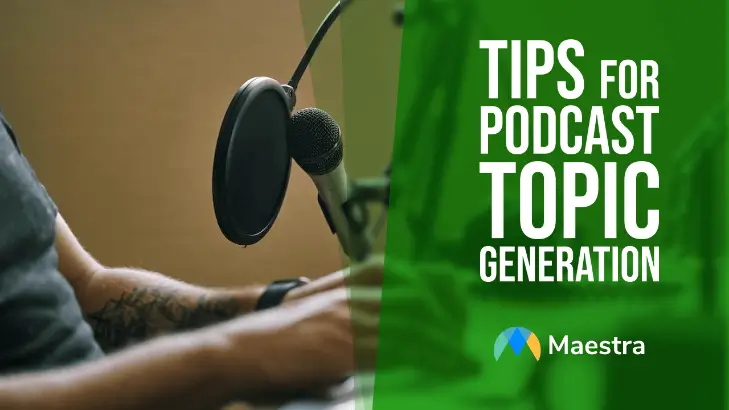Tips for Podcast Topic Generation

Define Your Audience
Before you start brainstorming topics, sit down and create a content marketing strategy for your podcast. Your audience is the lifeblood of your work, and without them, you would just be talking to a metaphorical wall. Each podcast has a different audience it wants to hit. Some are focused on true crime, or eager sports fans while others are geared toward people wanting to improve their quality of life. Defining your audience in detail is vital for being a good podcast host. You need to understand your target audience's point of view to pick the most relevant podcast topic ideas later on. An easy way to do this is to follow this formula for creating a marketing strategy:- Set a goal
- This should be something specific and attainable that you can invest in and actively work towards. Set a timeline for achieving that goal and analyze your progress regularly.
- Define Your “Persona”
- A “listener persona” is based on the term “buyer persona” and focuses on the idea of who your ideal customer (or in this case, listener) will be.
- Think of your target audience. What are the demographics you look to hit? Are you thinking of a particular age range? Gender? Race? Or are you wanting to attract folks based on the topic itself?
- These questions are broad but will help you focus on your ideal audience.
- A good way to think about it is to envision one specific person as your ideal listener, not a broad group of people.
- Think about more than demographics. Who is your target audience? What motivates them? What challenges do they face? How can you help?
- Other things to consider could be their financial situation, other interests and hobbies, and how they would be listening to your podcast (on the drive to work, sitting in the bathtub, on consistent plane trips).
- Brainstorm Ideas
- Solidify your concept. You may have a topic in mind after listing out ideas, but think about how you are going to hone in on that concept. We’ll dive more into this in the following sections.
- Create Your Content
- Simple enough, record your episodes, edit them, and publish them for the world to consume!
- Manage Your Content
- Analyze the data you have collected from people listening to your podcast to see if you are moving forward with your goals. If you aren’t, you may need to reanalyze some aspects of your topic.
Establishing a Format
Once you have your concept, it’s time to create a show! Formatting your podcast is another key component of creating a podcast that will be successful. The format must be consistent and easy to follow for potential listeners to understand what is going on. Some important questions to consider when thinking about podcast format are:- Who is going to host the podcast?
- How many people will appear on each podcast episode?
- Will you interview people?
- Will it be a rotating cast or open to guests?
- Will you be focusing on telling short stories or discussing particular topics each episode?
- Will your podcast be fully audio, or have additional video recordings?
- How regularly are you going to record episodes? What about posting episodes?
